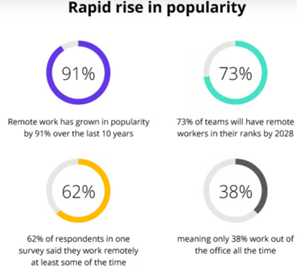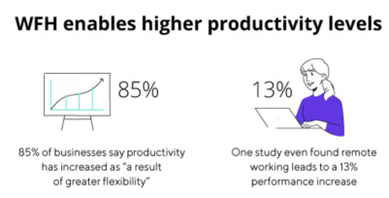Tips for Small Businesses to Conquer Challenges of Remote Work
Since the onset of the COVID-19 pandemic, remote work has gained popularity, transforming how businesses operate and providing benefits such as flexibility, cost efficiency, and access to a broader range of talent. According to a September 2020 survey conducted by the Australian Bureau of Statistics, over 40% of businesses in Australia with employees now engage in teleworking, a notable rise from the pre-pandemic figure of 28%. However, remote work comes with distinct challenges, particularly for smaller enterprises with limited budgets and smaller teams. Businesses of all sizes have faced a steep learning curve, and it appears that most of them are learning as they go.
Larger businesses are often able to invest in resources that help with this change. Unfortunately, smaller firms prefer to take a DIY approach to remote working, which can be challenging to manage when you’re trying to run your business while moving to a new way of doing things!
Recognising and Addressing Risks
Remote work brings forth various risks that businesses must handle with care. Being aware of these risks and preparing accordingly is crucial for making the most of remote work. Here are some of the risks:
- Data Security: When employees work remotely, they often handle sensitive information over potentially insecure networks, making them more susceptible to cyberattacks, phishing attempts, or unauthorised access. Businesses may lack the necessary technology or policies to adequately protect their data.
- Communication Challenges: Depending solely on technology for communication across different time zones and locations can lead to misunderstandings, delays, and conflicts. This is especially true for businesses that do not have advanced communication tools in place.
- Decreased Productivity: While remote work offers autonomy, it also brings distractions, feelings of isolation, and a potential lack of supervision, all of which can negatively impact productivity. Businesses may find it challenging to establish systems or metrics to effectively monitor and improve employee performance.
Recognising these risks is the initial step in turning remote work from a threat into an advantage. By implementing targeted strategies, businesses can mitigate these risks, ensuring that remote work becomes a valuable asset for growth and innovation.
Benefits of Remote Work for Businesses
Remote work offers several advantages for businesses, which contribute to improved productivity, cost savings, and employee satisfaction. Here are some reasons why remote work is beneficial for businesses:
- Increased Productivity
Studies have shown that remote workers often report higher productivity levels. Without the distractions of a traditional office setting, employees can focus better on their tasks. Flexible schedules allow employees to work during their most productive hours, leading to improved output.
- Cost Savings
Remote work can significantly reduce overhead costs for businesses. Companies save on expenses related to office space, utilities, and maintenance. There are also savings in terms of reduced commuting costs for employees, which can contribute to higher job satisfaction and retention.
- Access to a Global Talent Pool
With remote work, businesses can recruit talent from anywhere in the world, not limited by geographical boundaries. This access to diverse skill sets and perspectives can lead to innovation and improved problem-solving.
- Improved Employee Retention
Offering remote work options can increase employee satisfaction and loyalty. Employees appreciate the flexibility and work-life balance remote work provides. Businesses that offer remote work are often more attractive to top talent, reducing turnover rates. At a time when employee engagement is crucial for company success, implementing a remote work policy for all employees is essential for every company, agency, department, and organisation to contemplate and implement. When employees feel valued, they tend to demonstrate greater commitment to their organisation and its objectives.
- Reduced Environmental Impact
Remote work contributes to a reduction in carbon emissions due to decreased commuting. This aligns with many companies’ sustainability goals. Less reliance on physical offices means less energy consumption and a smaller carbon footprint.
- Enhanced Diversity and Inclusion
Remote work can promote diversity by enabling businesses to hire from underrepresented groups in different locations. It also removes potential biases that may exist in traditional office settings, creating a more inclusive work environment.

Source: https://www.wrike.com/blog/remote-work-stats-infographic/

Source: https://www.wrike.com/blog/remote-work-stats-infographic/
How to Implement a Successful Remote Work Policy
While inclusion is important, not every job is fit for remote work. Some occupations require an office because the work involved cannot be done online.
When creating a remote work policy, you should consider the following:
- Whether employees need to continue to reside close to the office.
- How frequently do you hold mandatory in-person meetings?
- Whether the firm should pay for expenditures associated with travel to the workplace
- Which positions are suitable for remote work?
- What criteria should be utilised to ensure work performance and cultural fit inside the organisation?
Before implementing a remote work policy, always engage with your legal, human resources, and finance teams. These departments can assist you in determining the benefits and drawbacks, compliance requirements, and tax consequences of remote work so that you do not lose time and resources if it is not suited for your firm.
Final Thoughts
Remote employment is a developing trend that allows organisations to innovate and expand. To flourish in this digital-first environment, firms must confront the risks of remote work and implement best practices in security, communication, and culture. These are not merely strategies; they are long-term investments.
By viewing remote work as an opportunity rather than a challenge, your business may change its work style and achieve greater efficiency, satisfaction, and success. Embrace remote work and build a flexible and dynamic corporate environment for everyone.







